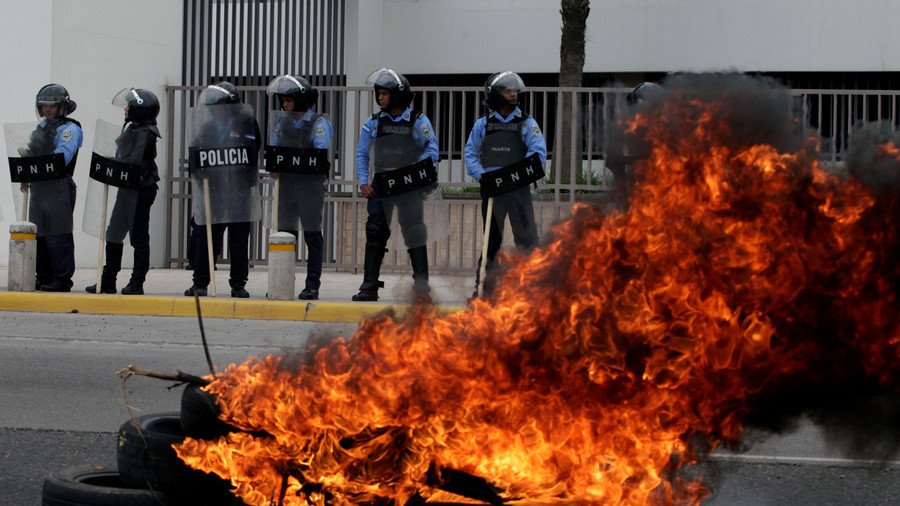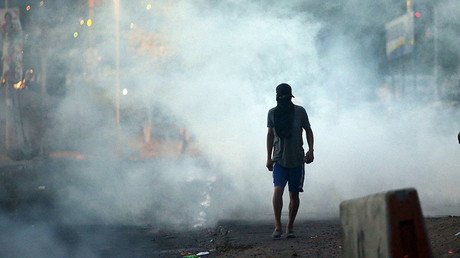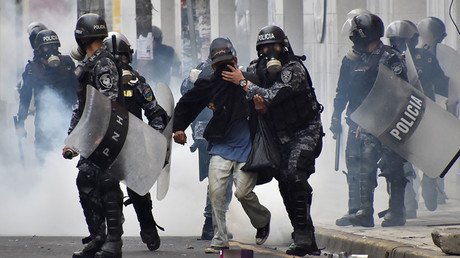UK arms Honduras, which uses the weapons to spy on its own people… all in the name of Brexit

Explosive data compiled by an anti-arms trade group has revealed that the UK government sold Honduras £300,000 (US$417,500)-worth of surveillance gear, which the Central American country has used against its own people.
The data, compiled by Campaign Against Arms Trade (CAAT), shows the UK traded arms with Honduras in the year leading up to the Central American nation’s disastrous 2017 election – which saw mass social unrest and the assassination of Honduran environmentalists and political activists.
According to the Consolidated and National Arms Export Licensing Criteria, the UK does not grant licenses if there is a clear risk that the items sold might be used for internal repression.
Andrew Smith, a CAAT spokesman, told RT that by arming the regime in Honduras, the UK government is complicit in how this equipment is used.
“The UK has a long and shameful history of arming and supporting human rights abusing regimes,” Smith said.
“Since the Brexit vote there have been worrying moves towards even closer relationships with dictatorships and authoritarian rulers … The UK is at a crossroads, and irrespective of how people voted on Brexit, the vast majority of people want the UK to be a force for good in the world and stand up for human rights and democracy, not to arm and support human rights abuses.”
Labour MP Lloyd Russell-Moyle, who sits on the new Committees on Arms Export Controls, also lashed out at Secretary of State for International Trade Liam Fox over the arms licensing, accusing him of being “complicit in the erosion of human rights in Honduras.”
“The British government has sold Honduras monitoring and decrypting technology expressly designed to eavesdrop on its citizens, months before the state rounded up hundreds of people in a well orchestrated surveillance operation,” Russell-Moyle told RT.
“British law is unambiguous. It says that the government cannot licence arms to nations that repress their own people.
“Before the government licensed these weapons it knew that the security services of Honduras were killing environmentalists, gay people and anyone in general who disagreed with them with impunity.
“It knew that the country had no independent judiciary, and it knew that Honduras’s deadly prisons are filled with people who have not faced justice, and may of whom are unfree due to their political beliefs.
“The government in general and Liam Fox in particular are complicit in the erosion of human rights in Honduras.
“I am not surprised the Tories don’t give a fig for human rights abroad but, as a new MP, I’m frankly astonished that the government so flagrantly breaks its own arms export law.”
Russell-Moyle has previously accused the Conservative Party of pushing forward with arms deals as a way to make the UK’s post-Brexit industrial landscape seem stronger.
“So why does Fox spend up to a billion pounds of our money every year to prop up such a controversial, dangerous and dysfunctional export industry? Because he is an ideologue. He believes that by exporting arms, Britain can somehow project power,” Russell-Moyle said in an op-ed for the Guardian in December.
A Whitehall source also told RT that “the UK’s post-Brexit industrial strategy is to let Liam Fox play fast and loose with UK arms export law and licence arms anywhere.”
A Department for International Trade (DIT) spokesman said assessments are made on a case-by-case basis to determine the impact of providing arms equipment and technology and its capabilities.
“The Government takes its arms export responsibilities very seriously operating one of the most robust arms export control regimes in the world,” the DIT spokesman told RT.
“Risks around human rights abuses are a key part of our licensing assessment.
“We do not export equipment where we assess there is a clear risk that it might be used for internal repression, or would provoke or prolong conflict within a country, or would be used aggressively against another country.”
Fox has been approached for comment.
Think your friends would be interested? Share this story!
















